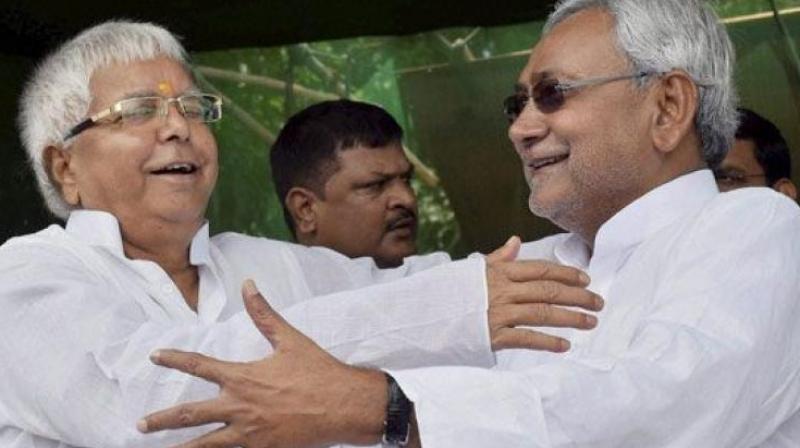Nitish-Lalu: The Bihari brothers
Nitish became minister of state for agriculture in the Vajpayee government and then briefly the Railway Minister in 1999.

Patna: Following the age-old proverb enemy's enemy is friend, the JD(U) leader Nitish Kumar whose party won just two of the states 40 seats in the Lok Sabha poll in 2014, joined hands with RJD chief Lalu Prasad to halt Narendra Modi’s juggernaut in the 2015 Assembly polls.
Kumar and Lalu, friend-turned-foe in state politics, sank their differences to revive an alliance that began over 40 years ago with the students agitation, which soon turned into a pan-India movement led by veteran socialist leader Jayaprakash Narayan.
Though Lalu got lucky in his very first outing in the electoral arena, winning Lok Sabha poll in 1977, it took Kumar, an electrical engineer from NIT Patna, then known as Bihar College of Engineering, eight more years to get elected to the assembly for the first time in 1985, after having lost twice.
Though as different as chalk and cheese, Kumar backed Lalu in bagging the chair of the Leader of Opposition in the Assembly in 1989 and again when he challenged Ram Sundar Das and Raghunath Jha, nominees of Prime Minister V.P. Singh and Chandra Shekhar respectively, for the Chief Ministers’ post after Janata Dal came to power in Bihar in 1990.
Kumar, who won the 1989 Lok Sabha polls from Barh, shifted his focus to Delhi, getting elected to the Lower House in 1991, 1996, 1998 and 1999.
He became minister of state for agriculture in the Vajpayee government and then briefly the Railway Minister in 1999.
He resigned after the train tragedy at Gaisal in West Bengal in 1999 in which nearly 300 people were killed. Kumar again became Railway Minister in 2001 and continued till 2004 during which period he was credited with introducing several reforms like internet ticket booking and
Tatkal system of instant booking. The Godhra train burning incident in February 2002, which provided the spark that led to communal riots in Gujarat, occurred during his tenure at Rail Bhavan.
The JD(U) stalwart reworked his social engineering strategy and made a rainbow coalition of OBCs, EBCs, Mahadalits and minorities that helped him sweep Bihar in November 2005 elections, thereby uprooting 15 years of uninterrupted Lalu-Rabri rule.
Bihar became a ‘dry state’ last year banning sale and consumption of all kinds of liquor in a move seen as fulfillment of a poll promise to women by Kumar.
Kumar’s passionate pitch for prohibition citing the adverse affects of domestic violence and broken families besides economic and health costs had earned overwhelming support from women for the ruling JD(U) in the 2015 assembly polls. He reiterated his commitment while announcing the ban.

